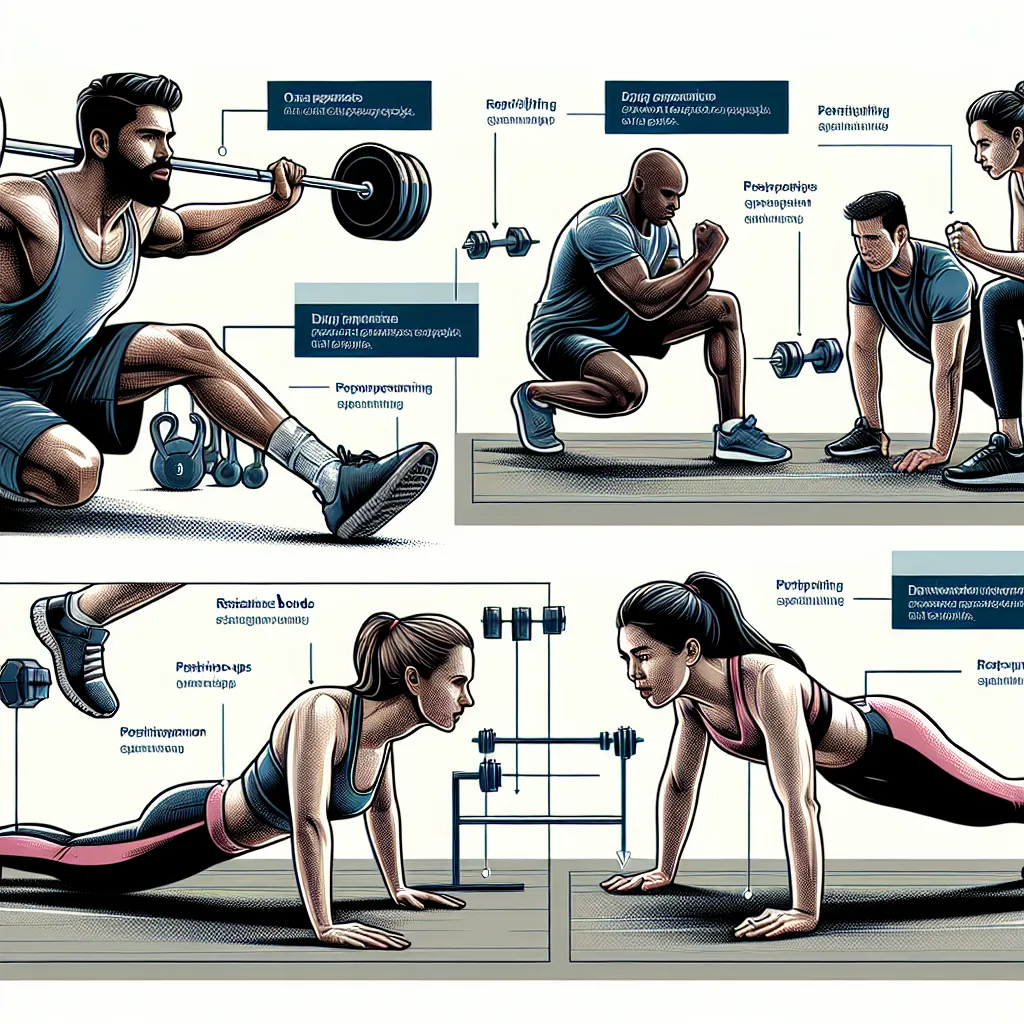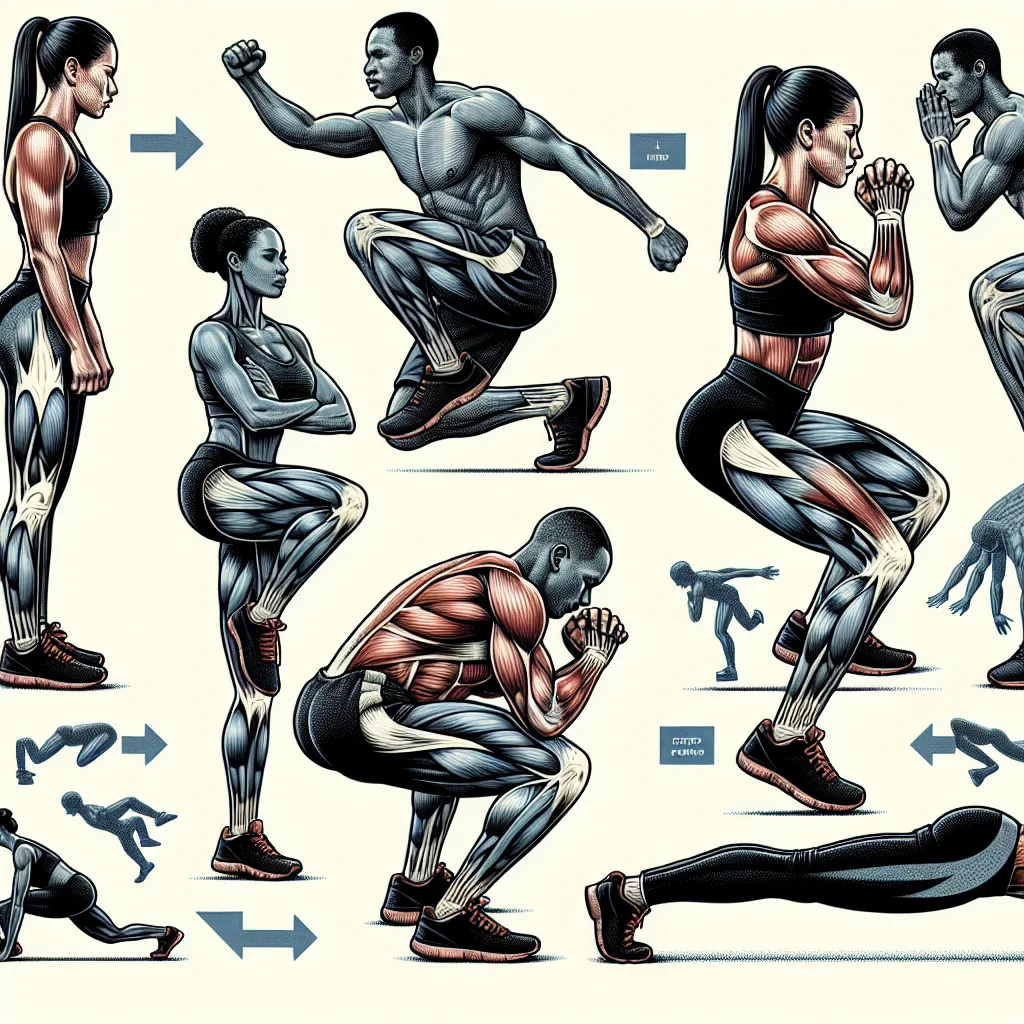Strength-building exercises are a crucial component of physical fitness and athletic training. For IELTS test-takers, understanding and effectively using this vocabulary can significantly enhance their performance in the exam. Let’s dive into the key terms, their usage, and how to master them for IELTS success.
Nội dung bài viết
Understanding the Term “Strength-Building Exercises”
Strength-building exercises (noun phrase)
Pronunciation: /streŋθ ˈbɪldɪŋ ˈeksəsaɪzɪz/
Definition: Physical activities designed to increase muscular strength and endurance through resistance training.
 Strength Building Exercises Illustration
Strength Building Exercises Illustration
Context and Usage
-
In fitness programs: “The personal trainer incorporated various strength-building exercises into the client’s workout routine to improve overall muscle tone.”
-
In sports training: “Professional athletes often engage in strength-building exercises during off-season to enhance their performance.”
-
In rehabilitation: “After his injury, the physiotherapist recommended specific strength-building exercises to regain muscle function in his leg.”
-
In health advice: “For better bone density and metabolism, doctors often suggest incorporating strength-building exercises into one’s weekly routine.”
-
In IELTS Writing Task 2: “Many health experts argue that strength-building exercises should be a mandatory part of school physical education programs to combat the rising obesity rates among youth.”
Analysis: In these examples, we can see how “strength-building exercises” is used across various contexts, from personal fitness to professional sports and even in academic discussions. This versatility makes it a valuable term for IELTS candidates to master.
Frequency in IELTS
The term “strength-building exercises” and related vocabulary are moderately common in IELTS, particularly in:
- Reading passages about health, fitness, and sports science
- Listening sections discussing gym routines or athletic training
- Writing Task 2 essays on topics related to health and education
- Speaking Part 3 when discussing health trends or lifestyle choices
Vocabulary Analysis
Word Structure
- Strength (noun): power, force
- Building (adjective): developing, increasing
- Exercises (noun): physical activities
Synonyms and Antonyms
-
Synonyms:
- Resistance training /rɪˈzɪstəns ˈtreɪnɪŋ/ (noun): Exercises that use resistance to induce muscular contraction
- Weight training /weɪt ˈtreɪnɪŋ/ (noun): Exercises using weights for resistance
- Muscle-strengthening activities /ˈmʌsl ˈstreŋθənɪŋ ækˈtɪvɪtiz/ (noun phrase): Exercises that increase muscle strength
-
Antonyms:
- Cardiovascular exercises /ˌkɑːdiəʊˈvæskjʊlər ˈeksəsaɪzɪz/ (noun phrase): Activities that improve heart and lung fitness
- Flexibility training /ˌfleksəˈbɪləti ˈtreɪnɪŋ/ (noun phrase): Exercises that improve range of motion and flexibility
Memory Techniques
Mind Mapping
Create a mind map with “Strength-Building Exercises” at the center, branching out to:
- Types: weightlifting, bodyweight exercises, resistance band workouts
- Benefits: increased muscle mass, improved bone density, better metabolism
- Equipment: dumbbells, barbells, resistance bands, weight machines
- Related terms: sets, repetitions, progressive overload
Imagery Technique
Imagine a construction worker (representing “building”) lifting heavy materials (symbolizing “strength”) while doing squats or lunges (the “exercises”). This visual can help cement the concept in your mind.
Practice Exercises
-
Sentence Formation: Create three sentences using “strength-building exercises” in different contexts (e.g., personal fitness, professional sports, health policy).
-
Paragraph Writing: Write a short paragraph about the benefits of incorporating strength-building exercises into daily routines. Use at least two synonyms from the list provided above.
-
IELTS-style Task 2 Question:
“Some people believe that strength-building exercises should be mandatory in schools. To what extent do you agree or disagree?”Plan an essay outline addressing this question, incorporating relevant vocabulary.
-
Listening Practice: Listen to a fitness podcast or watch a video about strength training. Note down any new related vocabulary you encounter.
Conclusion
Mastering the term “strength-building exercises” and its related vocabulary is crucial for IELTS success, especially when tackling health and fitness topics. By understanding its usage in various contexts, memorizing related terms, and practicing consistently, you’ll be well-equipped to use this vocabulary effectively in your IELTS exam.
Remember, the key to retaining new vocabulary is regular practice and application. Try to use these terms in your daily conversations or writing exercises. Don’t hesitate to share your own experiences with learning this vocabulary in the comments below, or ask any questions you might have about using these terms in the IELTS exam.


